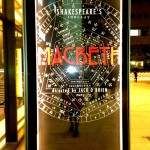Cultural Cocktail Hour
Theater Review: Macbeth at Lincoln Center Theater starring Ethan Hawke and Anne-Marie Duff– a Must See Production

Photography and text © 2013 Leticia Marie Sanchez
Cultural Cocktail Hour® is a registered trademark
By Leticia Marie Sanchez
No gimmicks. No tricks. Just pure unadulterated Shakespeare. Jack O’Brien’s poetic interpretation of Macbeth at Lincoln Center Theater reveals the essence of Shakespere’s text. This is where the magic happens.
The dark, sparse sets by Scott Pask enhanced the aura of mysticism provided by Mark Bennett’s musical score. The minimalist set design proved especially evocative when a single black vase of red roses graced the center stage during Duncan’s murder. The red underscored the passion between Macbeth and his wife, a lust that propelled bloody deeds. As Macbeth stabbed Duncan off-stage, the red petals floated to the floor one by one in poetic fashion, leaving a hauntingly empty vase in its wake.
The costumes by Catherine Zuber reflected the timelessness of Shakespeare’s play. The costumes occasionally alluded to more than one epoch: Edwardian, film noir, yet were successfully seamless because they immediately defined the interior world of the characters inhabiting them. For instance, with her black gloves, platinum tresses, and crimson lips, Anne-Marie Duff‘s Lady Macbeth looked every inch a Femme Fatale, her sylphlike frame belying steely ambition. Anne-Marie Duff embodied the full range of emotions necessary in a powerful Lady Macbeth: edgy, ruthless, seductive, and vulnerable. Furthermore, the palpable chemistry between Duff and Ethan Hawke provided the necessary fuel for the subsequent murder.
As Macbeth, Hawke delivered a naturalistic, charming interpretation. When a blood stained lackey appears at Macbeth’s dinner to reveal his attack on Banquo, Hawke asked, “Is he dispatched?” with such a light-hearted emphasis on the last word, the audience sees his chilling capacity to murder with ease. Hawke’s humor is an effective acting choice, a defensive shield demonstrating why, post-murder Macbeth does not descend (unlike his wife) into sleepwalking madness. Glib until the very end, Hawke muses, “I have almost forgot the taste of fears.” His humor corresponds with his hubris, as he rushes to battle blissfully unaware of his oncoming demise.
The entire cast effectively depicts the full palette of personalities in Macbeth’s orbit. Richard Easton personified the benevolence and gravitas of King Duncan with shades of charismatic playfulness as he tries to elicit a kiss from Lady Macbeth. Daniel Sunjata’s Macduff captures the passionate righteousness necessary to combat Macbeth. Particularly noteworthy was the performance of John Glover who portrayed both the Porter and a witch, stealing the show. In Act II, Scene 3, Glover as the Porter pointed to select members of the audience as though he were a stand up comedian, transforming the monologue into a hilarious, interactive piece. A live wire, Glover exposed the dynamic electricity possible in the theater. Finally, Glover, and the cast of witches (Byron Jennings, Malcolm Gets) illustrated the provocative gender-bending themes inherent in Shakespeare’s play by appearing as elderly men dressed in scanty black lingerie. This unorthodox vision is spot on with the Bard’s description. After all, when looking at the witches, Banquo remarked, “You should be women/And yet your beards forbid me to interpret/That you are so.” In other words, once again, Jack O’Brien’s Macbeth remained faithful to the text.
During the performance, a member of the audience sitting behind me gasped, whispering to her companion, “What a beautiful line.” Ultimately, this performance of Macbeth triumphed. Not only did it humanize the darker side of humanity, it illuminated the words of Shakespeare, through its stellar cast and poetic vision.













